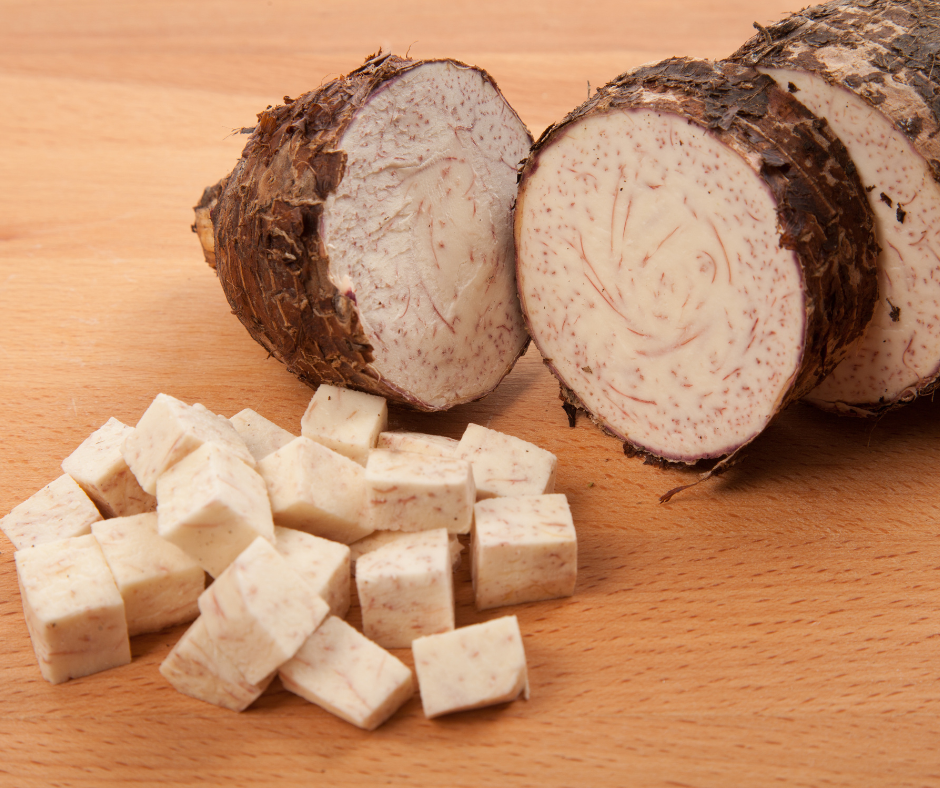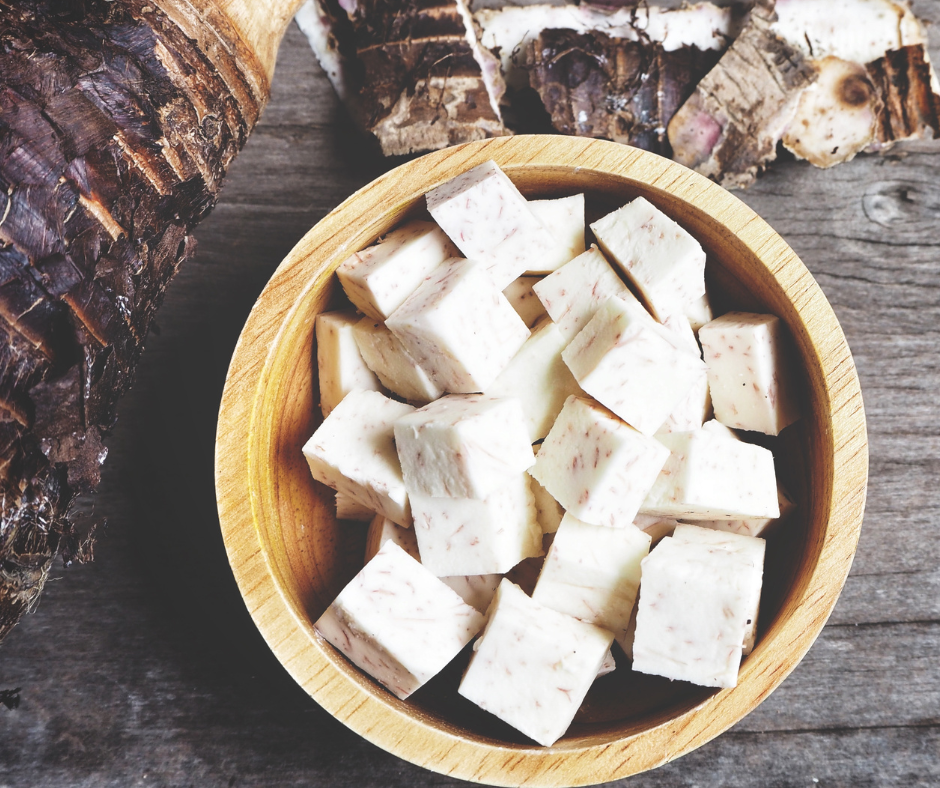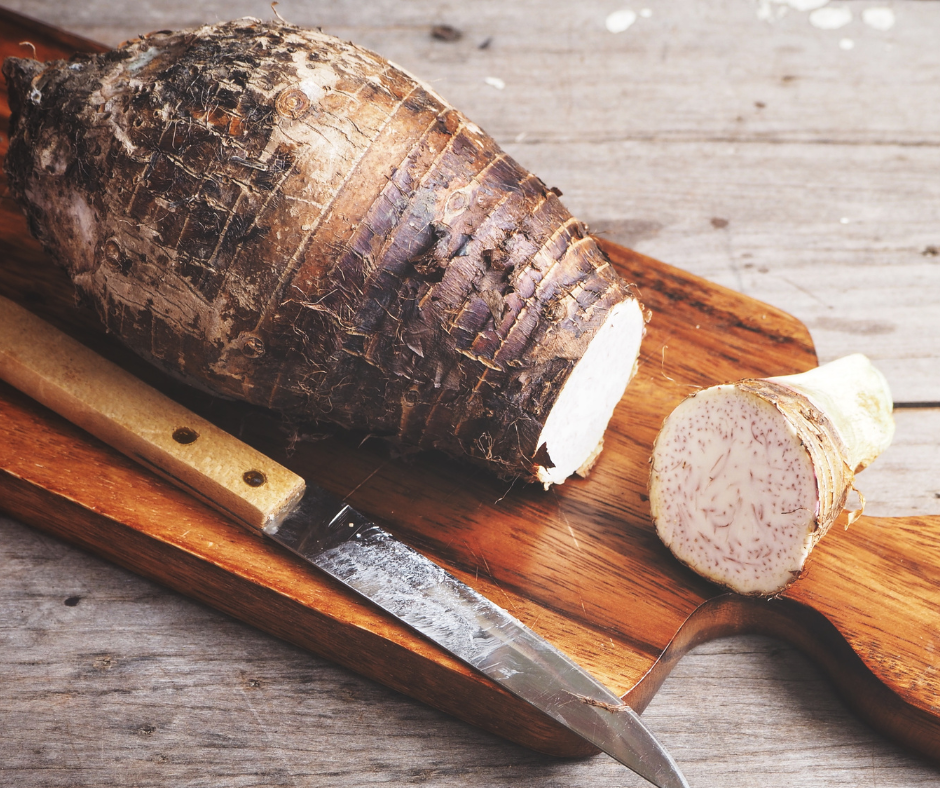Introduction
Taro is a root vegetable that has gained popularity among food enthusiasts, especially in bubble tea and desserts. This starchy tuber has a mild flavor, chewy texture, and creamy consistency, making it an ideal base for sweet and savory dishes.
Despite its delectable allure, one question often arises among health-conscious individuals: Does taro have caffeine? This frequent question is because taro is a common ingredient in bubble tea, a popular beverage among younger generations. As caffeine can have adverse effects on some individuals, including anxiety, insomnia, and elevated heart rate, people need to know the caffeine content of the food they consume.
But the good news is that taro does not contain caffeine. Unlike coffee beans, tea leaves, or cocoa beans, which naturally harbor caffeine, Taros are free from this stimulant, making them a healthy option for individuals sensitive to caffeine.
However, it’s crucial to note that some Taro-based products may contain caffeine, depending on the additives used in the recipe. Therefore, checking the ingredients and consulting the product packaging or manufacturers is recommended to provide accurate and up-to-date information regarding caffeine content.
In conclusion, taro does not contain caffeine, making it a safe and healthy option for individuals who wish to avoid or reduce caffeine intake.
Understanding Taro
What Is Taro?
Taro, or Colocasia esculenta, is a starchy root vegetable from the Araceae family. It originated in Southeast Asia but has since spread worldwide and is now widely cultivated in tropical and subtropical regions. Taro’s leaves and stems are also edible and are commonly used in soups and stews.
Where Is Taro Commonly Grown?
Taro is commonly grown in tropical and subtropical regions such as South Asia, Africa, the Caribbean, and the Pacific Islands. In the United States, Hawaii is the top producer of taro, a staple food in traditional Hawaiian cuisine. The plant requires a warm and wet climate to grow and thrives in well-drained, fertile soil.
Despite its growing popularity in various culinary creations, one common question arises among health-conscious individuals: Does taro have caffeine? While taro itself does not contain caffeine, it’s essential to check the ingredients of Taro-based products and consult product packaging or manufacturers for accurate and up-to-date information regarding caffeine content. Individuals with specific health concerns or dietary restrictions should consult a healthcare professional.
In conclusion, taro is a delicious and nutritious root vegetable widely used in various culinary preparations. Its caffeine-free nature makes it an ideal option for individuals sensitive to caffeine or wishing to reduce their caffeine intake.
Exploring Taro’s Nutritional Benefits
Taro’s Nutritional Properties
Taro is a highly nutritious root vegetable with a variety of health benefits. It is low in calories and fat, making it an excellent option for individuals looking to maintain a healthy weight. Taro is also a rich source of carbohydrates and dietary fiber and contains essential vitamins and minerals such as vitamins C, E, potassium, magnesium, iron, and zinc. These nutrients are vital in maintaining healthy blood pressure, supporting immune function, promoting proper digestion, and aiding in healthy skin and eye function.
The Uniqueness Of Taro’s Nutrients
One unique feature of taro is its high content of resistant starch. Resistant starch is a carbohydrate that bypasses digestion and behaves like fiber in the body. It can benefit intestinal and colon health by stimulating the growth of beneficial bacteria in the gut and reducing inflammation. Taro’s purple flesh also contains powerful antioxidants, such as anthocyanins, linked to reducing the risk of cancer, heart disease, and cognitive decline.
In summary, taro’s unique nutritional properties make it an excellent addition to a healthy diet. Its high content of key vitamins, minerals, and antioxidants offers numerous health benefits that can support overall wellness. While its caffeine-free nature is a bonus for those sensitive to caffeine, it’s important to check product ingredients and consult a healthcare professional for information on caffeine content when consuming taro-based products.
Caffeine: What It Is And Where It’s Found
What Is Caffeine?
Caffeine is a naturally occurring stimulant in various plants, including coffee beans, tea leaves, cocoa beans, and kola nuts. It is a central nervous system stimulant that can help improve mental alertness, concentration, and energy levels. However, too much caffeine consumption can lead to negative side effects, such as insomnia, anxiety, and heart palpitations.
What Foods And Drinks Contain Caffeine
Aside from coffee and tea, caffeine is also found in other foods and beverages, including:
- Soda and energy drinks
- Chocolate, especially dark chocolate
- Some medications, such as pain relievers, weight loss pills, and cold medicines
It is important to note that caffeine content can vary widely depending on the type and preparation method of the food or beverage. For example, an 8-ounce cup of coffee may contain anywhere from 95 to 165 mg of caffeine, while a 12-ounce can of soda may only have 30 to 40 mg.
Faster Metabolism
Caffeine has also been shown to increase metabolism and aid in weight loss. This is because it can stimulate the body’s thermogenesis process, which is responsible for burning calories. However, it is important not to rely solely on caffeine to aid in weight loss, as a healthy diet and exercise are key components for long-term success.
In summary, caffeine can provide various benefits in moderation, including increased mental alertness and metabolism. However, it is important to be mindful of caffeine in foods and beverages and not rely solely on it for weight loss or energy levels. As always, consulting with a healthcare professional for personalized advice is recommended.
The Caffeine Conundrum
Does Taro Have Caffeine?
The answer to this question is a straightforward NO. Taro does not contain caffeine naturally. Unlike coffee, tea, cocoa beans, and kola nuts, which are plant-based foods that naturally contain caffeine, taro is thus free from this stimulant.
Why Is It Important To Answer This Question?
Caffeine-sensitive people should know which foods and drinks they need to avoid to prevent the negative side effects of caffeine. Those who are health-conscious and want to control their caffeine intake should also know the amount of caffeine in their consumed foods and drinks.
Caffeine has positive and negative effects on the body, and people need to know how to regulate their caffeine intake to avoid experiencing the negative side effects. Aside from coffee and tea, caffeine is found in other foods and beverages, such as soda, chocolate, and some medications. Thus, knowing which foods and drinks are safe for sensitive individuals is essential.
In conclusion, taro does not contain caffeine naturally, making it a good choice for those sensitive to caffeine. However, it is important to remember that the caffeine content of food and beverages can vary and that people should be mindful of their caffeine intake.
Debunking The Myths
The Origin Of Myths Surrounding Taro Containing Caffeine
Taro is a starchy root vegetable mainly cultivated in tropical regions, including Africa, Asia, and the Pacific Islands. Although it has been used for centuries by different cultures as a staple food, it has only recently gained popularity in the Western world as an exotic ingredient in various dishes, especially desserts and drinks. With this newfound popularity, it is not surprising that some misconceptions about taro’s properties have emerged.
One of the myths that have been circulating about taro is that it contains caffeine. This belief probably comes from taro’s use as an ingredient in bubble tea, a popular Asian beverage containing tea, milk, and other flavorings. Since tea has caffeine, some people associate taro with caffeine as well.
What Truth Is There To The Myth Of Taro Containing Caffeine?
However, no scientific evidence supports the claims that taro contains caffeine. Taro is a root vegetable and does not naturally produce caffeine. The confusion may arise because taro-based products, such as bubble tea or sweet taro desserts, may contain other caffeine ingredients, such as tea or chocolate. However, these ingredients are added separately and are not inherent to the taro root.
In conclusion, taro is a caffeine-free root vegetable and a safe choice for those sensitive to caffeine or wanting to limit their caffeine intake. We must be aware of the ingredients in foods and drinks we consume to avoid any unwanted side effects. To avoid confusion or misunderstandings, it is always best to check the labels or ask the server about the ingredients before ordering a drink or food item containing taro.
It is important to separate myths from facts, especially regarding food. Knowing the truth about taro’s caffeine content can help people make informed decisions about their food choices and ultimately lead to a healthier lifestyle.
Unleashing The Delightful Taro Experience
How Do You Prepare Taro Dishes?
Taro, commonly known as Colocasia esculenta, is a root vegetable indigenous to tropical African and Asian regions and the Pacific Islands. It is a versatile vegetable and can be incorporated into a wide range of dishes – from sweet to savory.
In Southeast Asia, Taro is used in soups and stews, mashed and roasted as a standalone dish, and even deep-fried for a crisp snack. Its sweet, nutty flavor is popular in desserts like ice cream, cakes, and pastries. For those health-conscious individuals, taro chips can be a great alternative to potato chips.
From Teas To Pastries, A Variety Of Delectable Treats Offered With Taro
In recent years, taro’s popularity has grown internationally, becoming a staple ingredient in many food and beverage establishments. Taro bubble tea, a Taiwanese tea-based beverage, is one of the most popular beverages featuring taro due to its creamy and refreshing taste.
Taro can also be used in pastries and confectioneries like taro buns and mochi. These pastries offer a unique flavor profile blended with traditional pastry textures made with rice flour or wheat.
In conclusion, taro’s versatility makes it a great choice when cooking for any meal of the day. While there may be myths regarding its caffeine content, taro is a caffeine-free option and a safe choice for those looking to avoid this stimulant. So next time you explore different cuisines, don’t be afraid to try taro and experience its delightful taste.
Conclusion
Answering The Question: Does Taro Have Caffeine?
Despite its popularity, some myths have circulated challenging taro’s caffeine content. So, does taro have caffeine? The answer is no. Unlike coffee beans, tea leaves, or cocoa beans, taro does not contain caffeine naturally.
Summarizing Findings And Ending Thoughts
In conclusion, taro’s versatility makes it an excellent choice for any meal of the day. You can use taro to create exciting, delicious, sweet, and savory dishes. Although myths about taro’s caffeine content have circulated, there is no truth behind them. Taro is a caffeine-free option, making it a safe choice for those looking to avoid this stimulant in their diet. So why not try taro in your next culinary adventure and experience its delightful taste?
FAQ About Does Taro Have Caffeine: Understanding Taro’s Properties
Q: Does taro naturally contain caffeine?
A: No, the Taro root itself does not contain caffeine.
Q: Where does the caffeine in Taro beverages come from?
A: The caffeine in Taro beverages comes from the tea used as a base.
Q: Is taro a safe option for those monitoring their caffeine intake?
A: Yes, Taro is a safe option for those monitoring their caffeine intake as it does not naturally contain caffeine.
Q: What are the benefits of taro?
A: Taro is a versatile root vegetable that is rich in fiber, potassium, and vitamins C and E. It also helps regulate digestion and supports healthy blood pressure levels.
Q: What are some popular Taro-based treats?
A: Taro can be transformed into various delectable treats such as Taro milk tea, Taro-flavored ice cream, and pastries.
Q: What is the flavor profile of taro?
A: Taro has a subtly sweet and nutty flavor, making it a popular ingredient in both savory and sweet dishes.
Q: What is Taro also known as?
A: Taro is also known as Colocasia esculenta and is native to Southeast Asia and the Pacific Islands.
Understanding these properties of taro can help in making an informed choice that aligns with one’s health and taste preferences. With its versatile nature and unique flavor, taro can be a delicious addition to any diet.



